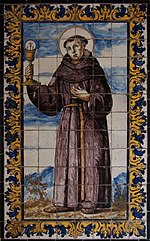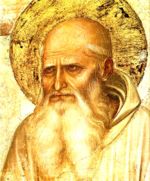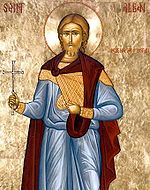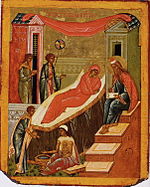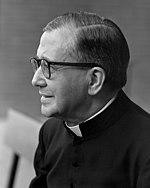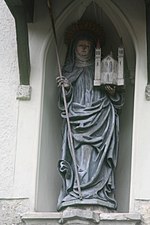Portal:Catholic Church/Patron Archive/June
Patron Archive
January - February - March - April - May - June - July - August - September - October - November - December
Today is Thursday, December 26, 2024; it is now 18:45 UTC
Justin, known posthumously as Justin Martyr (Greek: Ἰουστῖνος ὁ Μάρτυς, romanized: Ioustînos ho Mártys; c. AD 100 – c. AD 165), also known as Justin the Philosopher, was an early Christian apologist and philosopher.
Most of his works are lost, but two apologies and a dialogue did survive. The First Apology, his most well-known text, passionately defends the morality of the Christian life, and provides various ethical and philosophical arguments to convince the Roman emperor Antoninus Pius to abandon the persecution of the Church. Further, he also indicates, as St. Augustine would later, regarding the "true religion" that predated Christianity, that the "seeds of Christianity" (manifestations of the Logos acting in history) actually predated Christ's incarnation. This notion allows him to claim many historical Greek philosophers (including Socrates and Plato), in whose works he was well studied, as unknowing Christians. (Full article...)
Attributes: Philosopher's coat, palm tree
Patronage: Philosophers
See also: Annibale Maria di Francia
Erasmus of Formia, also known as Saint Elmo (died c. 303), was a Christian saint and martyr. He is venerated as the patron saint of sailors and abdominal pain. Erasmus or Elmo is also one of the Fourteen Holy Helpers, saintly figures of Christian religion who are venerated especially as intercessors. (Full article...)
Attributes: Represented with his entrails wound on a windlass or as a vested bishop holding a winch or windlass
Patronage: sailors, Gaeta, Formia, colic in children, intestinal ailments and diseases, cramps and the pain of women in labor, cattle pest, Fort St. Elmo, (Malta)
See also: Marcellinus and Peter, Felix of Nicosia
Charles Lwanga (Luganda: Kaloli Lwanga; 1 January 1860 – 3 June 1886) was a Ugandan convert to the Catholic Church who was martyred with a group of his peers and is revered as a saint by both the Catholic Church and the Anglican Communion.
A member of the Baganda tribe, Lwanga was born in the Kingdom of Buganda, the central and southern part of modern Uganda, and served as chief of the royal pages and later major-domo in the court of King Mwanga II of Buganda. He was baptised by Pere Giraud on 15 November 1885. (Full article...)
Attributes: -
Patronage: African Catholic Youth Action, converts, torture victims
See also: Genesius (bishop of Clermont); Adamo Abate; Juan Grande Román, Spain; Achilleus Kewanuka, Uganda
Maria Elizabeth Hesselblad, OSsS (4 June 1870 – 24 April 1957), was a Swedish Catholic religious sister who founded a new, active, branch of the Bridgettines known as the Bridgettine Sisters. Hesselblad is recognised as a Righteous Among the Nations due to her efforts in World War II saving the lives of Jews during the genocide of the Holocaust.
Pope John Paul II beatified her on 9 April 2000 and Pope Francis canonised her 5 June 2016 at Saint Peter's Square. (Full article...)
Attributes: Religious habit
Patronage: Bridgettine Sisters, nurses, converts
See also: Filippo Smaldone, Francis Caracciolo
Boniface (born Wynfreth; c. 675 – 5 June 754) was an English Benedictine monk and leading figure in the Anglo-Saxon mission to the Germanic parts of Francia during the eighth century. He organised significant foundations of the church in Germany and was made bishop of Mainz by Pope Gregory III. He was martyred in Frisia in 754, along with 52 others, and his remains were returned to Fulda, where they rest in a sarcophagus which remains a site of Christian pilgrimage. (Full article...)
Prayer: In her voyage across the ocean of this world, the Church is like a great ship being pounded by the waves of life's different stresses. Our duty is not to abandon ship but to keep her on her course. Let us stand fast in what is right, and prepare our souls for trial. Let us wait upon God's strengthening aid and say to him: "O Lord, you have been our refuge in all generations." Let us trust in him who has placed this burden upon us. What we ourselves cannot bear let us bear with the help of Christ. For he is all-powerful, and he tells us: "My yoke is easy, and my burden light." Let us continue the fight on the day of the Lord. The days of anguish and of tribulation have overtaken us; if God so wills, "let us die for the holy laws of our fathers," so that we may deserve to obtain an eternal inheritance with them.
Attributes: In bishop's robes, book pierced by a sword (also axe; oak; scourge)
Patronage: Fulda; Germania; England (Orthodox Church; jointly with Ss. Augustine of Canterbury, and Cuthbert of Lindisfarne)
Norbert of Xanten, O. Praem (c. 1075 – 6 June 1134) (Gennep-Magdeburg), also known as Norbert Gennep, was Archbishop of Magdeburg, founder of the Premonstratensian order of canons regular, and is venerated as a saint in the Catholic Church. Norbert was canonized by Pope Gregory XIII in the year 1582, and his statue appears above the Piazza colonnade of St. Peter's Square in Rome. (Full article...)
Attributes: monstrance; cross with two beams
Patronage: Kingdom of Bohemia (now Czech Republic), invoked during childbirth for safe delivery; Magdeburg
See also: Marcellin Champagnat, France
Robert of Newminster (c. 1100–1159) was a priest, abbot, and a saint of the Catholic Church. He was born in Gargrave in Yorkshire, England. He was one of the monks who founded Fountains Abbey and is named from the abbey he founded in Morpeth, Northumberland. (Full article...)
Attributes: depicted as an abbot holding a church
Patronage: -
See also: Antonio Maria Gianelli
Jacques Berthieu, SJ (born 27 November 1838 at Polminhac, Cantal, France; died 8 June 1896 at Ambiatibe, Madagascar), was a French Jesuit, priest and missionary in Madagascar. He died during the Menalamba rebellion of 1896. Berthieu was 57 years old. He is the first martyr of Madagascar to be beatified. He was canonized a saint by Pope Benedict XVI, along with others, at a papal canonization Mass on 21 October 2012, during a meeting of the Catholic Synod of Bishops. (Full article...)
Attributes: -
Patronage: -
See also: Medardus; Jadwiga of Poland; Mariam Thresia Chiramel, India
Columba (/kəˈlʌmbəˌ ˈkɒlʌmbə/) or Colmcille (7 December 521 – 9 June 597 AD) was an Irish abbot and missionary evangelist credited with spreading Christianity in what is today Scotland at the start of the Hiberno-Scottish mission. He founded the important abbey on Iona, which became a dominant religious and political institution in the region for centuries. He is the patron saint of Derry. He was highly regarded by both the Gaels of Dál Riata and the Picts, and is remembered today as a Catholic saint and one of the Twelve Apostles of Ireland. (Full article...)
Attributes: Monk's robes, Celtic tonsure and crosier
Patronage: Derry, floods, bookbinders, poets, Ireland, and Scotland
See also: Joseph of Anchieta, Ephrem the Syrian
Saint Maximus of Aveia (d. ca. 250 AD) (sometimes also known as Saint Maximus of Aquila) is one of the patron saints of L'Aquila, Italy. (Full article...)
Attributes: -
Patronage: L'Aquila
Barnabas (/ˈbɑːrnəbəs/; Ancient Greek: Βαρνάβας; Syriac: ܒܪܢܒܐ), born Joseph (Ἰωσήφ) or Joses (Ἰωσής), was according to tradition an early Christian, one of the prominent Christian disciples in Jerusalem. According to Acts 4:36, Barnabas was a Cypriot Levite. Identified as an apostle in Acts 14:14, he and Paul the Apostle undertook missionary journeys together and defended Gentile converts against the Judaizers. They traveled together making more converts (c. 46–48 AD), and participated in the Council of Jerusalem (c. 49 AD). Barnabas and Paul successfully evangelized among the "God-fearing" Gentiles who attended synagogues in various Hellenized cities of Anatolia. (Full article...)
Attributes: Red Martyr, Pilgrim's staff; olive branch; holding the Gospel of Matthew
Patronage: Cyprus, Antioch, against hailstorms, invoked as peacemaker
See also: Paula Frassinetti
John of Sahagún, OESA (Spanish: Juan de Sahagún), (c. 1430 – 11 June 1479) was a Spanish Augustinian friar and priest. He was a leading preacher of his day, and was known as a peacemaker and reconciler of enemies among the nobles and factions of Salamanca. He was declared a saint by the Catholic Church in 1690 by Pope Alexander VIII. (Full article...)
Attributes: holding a Chalice and the Holy Host surrounded by rays of light
Patronage: Candon City, Toledo, Cebu
See also: Gaspare Bertoni
Anthony of Padua, OFM, (Portuguese: António/Antônio de Pádua; Italian: Antonio di/da Padova; Latin: Antonius Patavinus) or Anthony of Lisbon (Portuguese: António/Antônio de Lisboa; Italian: Antonio da/di Lisbona; Latin: Antonius Olisiponensis; born Fernando Martins de Bulhões; 15 August 1195 – 13 June 1231) was a Portuguese Catholic priest and member of the Order of Friars Minor. (Full article...)
Attributes: Book; bread; Infant Jesus; lily; fish; flaming heart; mule
Patronage: Lisbon, Lost items, lost people, lost souls, American Indians; amputees; animals; barrenness; Brazil; elderly people; faith in the Blessed Sacrament; fishermen; Franciscan Custody of the Holy Land; harvests; horses; lower animals; mail; mariners; oppressed people; poor people; Portugal; pregnant women; shipwrecks; starvation; sterility; swineherds; Tigua Indians; travel hostesses; travellers; Tuburan, Cebu; San Vicente, Sulat, Eastern Samar; Watermen; runts of litters; counter-revolutionaries; Pila, Laguna, Taytay, Rizal; Iriga, Camarines Sur; Camaligan, Camarines Sur
See also: Gerard of Clairvaux
Elisha was, according to the Hebrew Bible, a Jewish prophet and a wonder-worker. His name is commonly transliterated into English as Elisha via Hebrew, Eliseus via Greek and Latin, Ełishe (Yeghishe/Elisha) via Armenian or Alyasa via Arabic, and Elyasa or Elyesa via Turkish. Also mentioned in the New Testament and the Quran, Elisha is venerated as a prophet in Judaism, Christianity and Islam and writings of the Bahá'í Faith refer to him by name. (Full article...)
Attributes: Clothed as a prophet, often holding a scroll
Patronage: -
Vitus (/ˈvaɪtəs/), whose name is sometimes rendered Guy or Guido, was a Christian martyr from Sicily. His surviving hagiography is pure legend. The dates of his actual life are unknown. He has for long been tied to the Sicilian martyrs Modestus and Crescentia but in the earliest sources it is clear that these were originally different traditions that later became combined. The figures of Modestus and Crescentia are probably fictitious.
According to his legend, he died during the Diocletianic Persecution in AD 303. In the Middle Ages, he was counted as one of the Fourteen Holy Helpers. In Germany, his feast was celebrated with dancing before his statue. This dancing became popular and the name "Saint Vitus Dance" was given to the neurological disorder Sydenham's chorea. It also led to Vitus being considered the patron saint of dancers and of entertainers in general. He is also said to protect against lightning strikes, animal attacks and oversleeping. His feast day is celebrated on 15 June. In places where the Julian calendar is used, this date coincides, in the 20th and 21st centuries, with 28 June on the Gregorian calendar. (Full article...)
Attributes: depicted in a cauldron, with a rooster or a lion
Patronage: actors; comedians; Rijeka, Croatia; Czechoslovakia; dancers; dogs; epilepsy; Mazara del Vallo, Sicily; Forio, Ischia; oversleeping; Prague, Czech Republic; rheumatic chorea (Saint Vitus Dance); Serbia; snake bites; storms; Vacha, Germany; Zeven, Lower Saxony; Het Gooi, Netherlands
See also: Germaine Cousin, France
Benno may refer to: (Full article...)
Attributes: book, fish with keys in its mouth
Patronage: fishermen, weavers, Dresden-Meissen, Munich
See also: Lutgardis, Belgium
Albert Chmielowski (20 August 1845 – 25 December 1916) - born Adam Hilary Bernard Chmielowski - was a Polish Franciscan tertiary, painter, and disabled veteran of the Uprising of 1863. He was founder of both the Albertine Brothers and Albertine Sisters who are servants of the homeless and destitute. (Full article...)
Attributes: Priest's attire
Patronage: Painters; Servants of the Poor; Sisters Servants of the Poor; Franciscan tertiaries; Soldiers; Volunteers; Harvests; Travellers; Puławy; Diocese of Sosnowiec
See also: Botwulf of Thorney
Elisabeth of Schönau (c. 1129 – 18 June 1164) was a German Benedictine visionary. She was an abbess at the Schönau Abbey in the Duchy of Nassau, and reportedly experienced numerous religious visions, for which she became widely sought after by many powerful men as far away as France and England. (Full article...)
Attributes: -
Patronage: -
See also: Gregorio Barbarigo
Romuald (Latin: Romualdus; c. 951 – traditionally 19 June, c. 1025/27 AD) was the founder of the Camaldolese order and a major figure in the eleventh-century "Renaissance of eremitical asceticism". Romuald spent about 30 years traversing Italy, founding and reforming monasteries and hermitages. (Full article...)
Attributes: -
Patronage: -
Pope Silverius (died 2 December 537) was bishop of Rome from 8 June 536 to his deposition in 537, a few months before his death. His rapid rise to prominence from a deacon to the papacy coincided with the efforts of Ostrogothic king Theodahad (nephew to Theodoric the Great), who intended to install a pro-Gothic candidate just before the Gothic War. Later deposed by Byzantine general Belisarius, he was tried and sent to exile on the desolated island of Palmarola, where he starved to death in 537. (Full article...)
Attributes: -
Patronage: -
See also: Irish Catholic Martyrs
Aloysius de Gonzaga, SJ (Italian: Luigi Gonzaga; 9 March 1568 – 21 June 1591) was an Italian aristocrat who became a member of the Society of Jesus. While still a student at the Roman College, he died as a result of caring for the victims of a serious epidemic. He was beatified in 1605 and canonized in 1726. (Full article...)
Prayer: "Marian Prayer of St. Aloysius Gonzaga" (Indicative of the Aloysius Gonzaga's devotion to the Blessed Virgin Mary) O my mother, into thy blessed trust and custody, and into the care of thy mercy, I this day, every day, and in the hour of my death, commend my soul and my body. To thee I commit all my anxieties and miseries, my life and the end of my life, that by thy most holy intercession and by thy merits all my actions may be directed and disposed according to thy will and that of thy Son. Amen.
Attributes: Lily, Crown (headgear), cross, skull, rosary
Patronage: Young students, Christian youth, Jesuit scholastics, the blind, AIDS patients, AIDS care-givers
See also: John Rigby, England
Saint Alban (/ˈɔːlbən, ˈæl-/; Latin: Albanus) is venerated as the first-recorded British Christian martyr, for which reason he is considered to be the British protomartyr. Along with fellow Saints Julius and Aaron, Alban is one of three named martyrs recorded at an early date from Roman Britain ("Amphibalus" was the name given much later to the priest he was said to have been protecting). He is traditionally believed to have been beheaded in Verulamium (modern St Albans) sometime during the 3rd or 4th century, and has been celebrated there since ancient times. (Full article...)
Attributes: Soldier with a very large cross and a sword; decapitated, with his head in a holly bush and the eyes of his executioner dropping out
Patronage: converts, refugees, torture victims
See also: Paulinus of Nola, John Fisher, Thomas More
Æthelthryth (or Æðelþryð or Æþelðryþe; c. 636 – 23 June 679 AD) was an East Anglian princess, a Fenland and Northumbrian queen and Abbess of Ely. She is an Anglo-Saxon saint, and is also known as Etheldreda or Audrey, especially in religious contexts. She was a daughter of Anna, King of East Anglia, and her siblings were Wendreda and Seaxburh of Ely, both of whom eventually retired from secular life and founded abbeys. (Full article...)
Attributes: Abbess holding a model of Ely Cathedral
Patronage: Throat complaints
See also: Joseph Cafasso
The Nativity of John the Baptist (or Birth of John the Baptist, or Nativity of the Forerunner, or colloquially Johnmas or St. John's Day (in German) Johannistag) is a Christian feast day. It is observed annually on 24 June. The Nativity of John the Baptist is a high-ranking liturgical feast, kept in the Catholic Church, Eastern Orthodox Church, Anglicanism, and Lutheranism. The sole biblical account of the birth of John the Baptist comes from the Gospel of Luke. (Full article...)
Attributes: -
Patronage: Florence, Italy
Prosper of Reggio (Italian: San Prospero; died 25 June c. 466) is an Italian saint. Tradition holds that he was a bishop of Reggio Emilia for twenty-two years. Little is known of his life, but documents attest that he was indeed bishop of Reggio Emilia in the fifth century.
Remembered for his sense of charity, he is the patron saint of Reggio Emilia, although its cathedral is not dedicated to him. Instead, the church of San Prospero, which Prosper himself had built and dedicated to Saint Apollinaris, commemorates his episcopate. He died at Reggio Emilia. (Full article...)
Attributes: Book; model of Reggio Emilia; episcopal dress
Patronage: Reggio Emilia
See also: Maximus of Turin
Josemaría Escrivá de Balaguer y Albás, born Jose María Escribá Albás, (9 January 1902 – 26 June 1975) was a Spanish Catholic priest who founded Opus Dei, an organization of laypeople and priests dedicated to the principle of everyday holiness. He was canonized in 2002 by Pope John Paul II, who declared Josemaría should be "counted among the great witnesses of Christianity." (Full article...)
Attributes: -
Patronage: Opus Dei
See also: Vincenza Gerosa
Cyril of Alexandria (Ancient Greek: Κύριλλος Ἀλεξανδρείας; Coptic: Ⲡⲁⲡⲁ Ⲕⲩⲣⲓⲗⲗⲟⲩ ⲁ̅ or ⲡⲓ̀ⲁⲅⲓⲟⲥ Ⲕⲓⲣⲓⲗⲗⲟⲥ; c. 376–444) was the Patriarch of Alexandria from 412 to 444. He was enthroned when the city was at the height of its influence and power within the Roman Empire. Cyril wrote extensively and was a major player in the Christological controversies of the late-4th and 5th centuries. He was a central figure in the Council of Ephesus in 431, which led to the deposition of Nestorius as Patriarch of Constantinople.
Cyril is counted among the Church Fathers and also as a Doctor of the Church, and his reputation within the Christian world has resulted in his titles Pillar of Faith and Seal of all the Fathers. The Nestorian bishops at their synod at the Council of Ephesus declared him a heretic, labelling him as a "monster, born and educated for the destruction of the church". (Full article...)
Attributes: Vested as a Bishop with phelonion and omophorion, and usually with his head covered in the manner of Egyptian monastics (sometimes the head covering has a polystavrion pattern); depicted holding a Gospel Book or a scroll, with his right hand raised in blessing.
Patronage: Alexandria
See also: Hemma of Gurk; John Southworth, England; Marguerite Bays
Irenaeus (/ɪrɪˈneɪəs/ or /ˌaɪrɪˈniːəs/; Ancient Greek: Εἰρηναῖος, romanized: Eirēnaîos; c. 130 – c. 202 AD) was a Greek bishop noted for his role in guiding and expanding Christian communities in the southern regions of present-day France and, more widely, for the development of Christian theology by combating heterodox or Gnostic interpretations of Scripture as heresy and defining proto-orthodoxy. Originating from Smyrna, he had seen and heard the preaching of Polycarp, who in turn was said to have heard John the Evangelist. (Full article...)
Attributes: -
Patronage: -
The Feast of Saints Peter and Paul or Solemnity of Saints Peter and Paul is a liturgical feast in honor of the martyrdom in Rome of the apostles Saint Peter and Saint Paul, which is observed on 29 June. The celebration is of ancient Christian origin, the date selected being the anniversary of either their death or the translation of their relics. (Full article...)
Attributes: -
Patronage: -
Erentrude (also known as Ehrentraud, Erendrudis, Erentruy, Erndrude, Arentruda, Ariotruda and Arndruda) was a saint and abbess, born during the end of the 7th century, probably in present-day Germany or Austria. She was born into a Franconian-Merovingian royal house, and was the niece of Rupert of Salzburg. She left her home country to assist Rupert in establishing religious communities in Salzburg; in about 700, he built a convent, Nonnberg Abbey, and installed her as its first abbess. She and the nuns at Nonnberg served the poor, needy, and ill, striking a balance between living as cloistered nuns and engaging in charitable works. Erentrude died on 30 June 718. Her fame for healing miracles and intercession grew after her death, and many legends have arisen throughout the centuries since her death. In 2006, Erentrude's image appeared on the Austrian Nonnberg Abbey commemorative coin. Her feast day is celebrated on 30 June. (Full article...)
Attributes: -
Patronage: -
See also: First Martyrs of the Church of Rome












